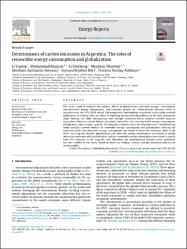Determinants of carbon emissions in Argentina: The roles of renewable energy consumption and globalization

Göster/
Tarih
2021Yazar
Yuping, LiRamzan, Muhammad
Xincheng, Li
Murshed, Muntasir
Awosusi, Abraham Ayobamiji
Bah, Sununu Ibrahim
Adebayo, Tomiwa Sunday
Üst veri
Tüm öğe kaydını gösterÖzet
This study aimed to evaluate the dynamic effects of globalization, renewable energy consumption,
non-renewable energy consumption, and economic growth on carbon-dioxide emission levels in
Argentina over the 1970–2018 period. The econometric methodology considered in this study involved
applications of methods that are robust to handling structural break problems in the data. Among the
major findings, the Maki cointegration, with multiple structural breaks, analysis revealed long-run
associations between carbon-dioxide emissions, renewable and non-renewable energy consumption,
globalization, and economic growth. The elasticity estimates from the Autoregressive Distributed Lag
model analysis showed evidence of renewable energy consumption and globalization reducing the
emissions while non-renewable energy consumption was found to boost the emissions, both in the
short- and long-run. Besides, globalization and renewable energy consumption were found to jointly
reduce the emissions while globalization and non-renewable energy consumption were found to jointly
boost the emissions in the long-run only. Moreover, the environmental Kuznets curve hypothesis
was also verified in this study. Based on these key findings, several critically important policies are
recommended.
Cilt
7Bağlantı
https://hdl.handle.net/11363/5168Koleksiyonlar
Aşağıdaki lisans dosyası bu öğe ile ilişkilidir:

















